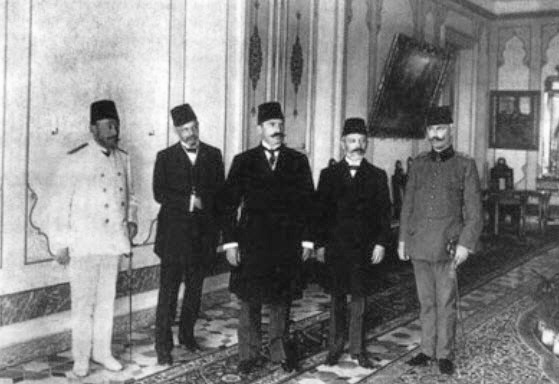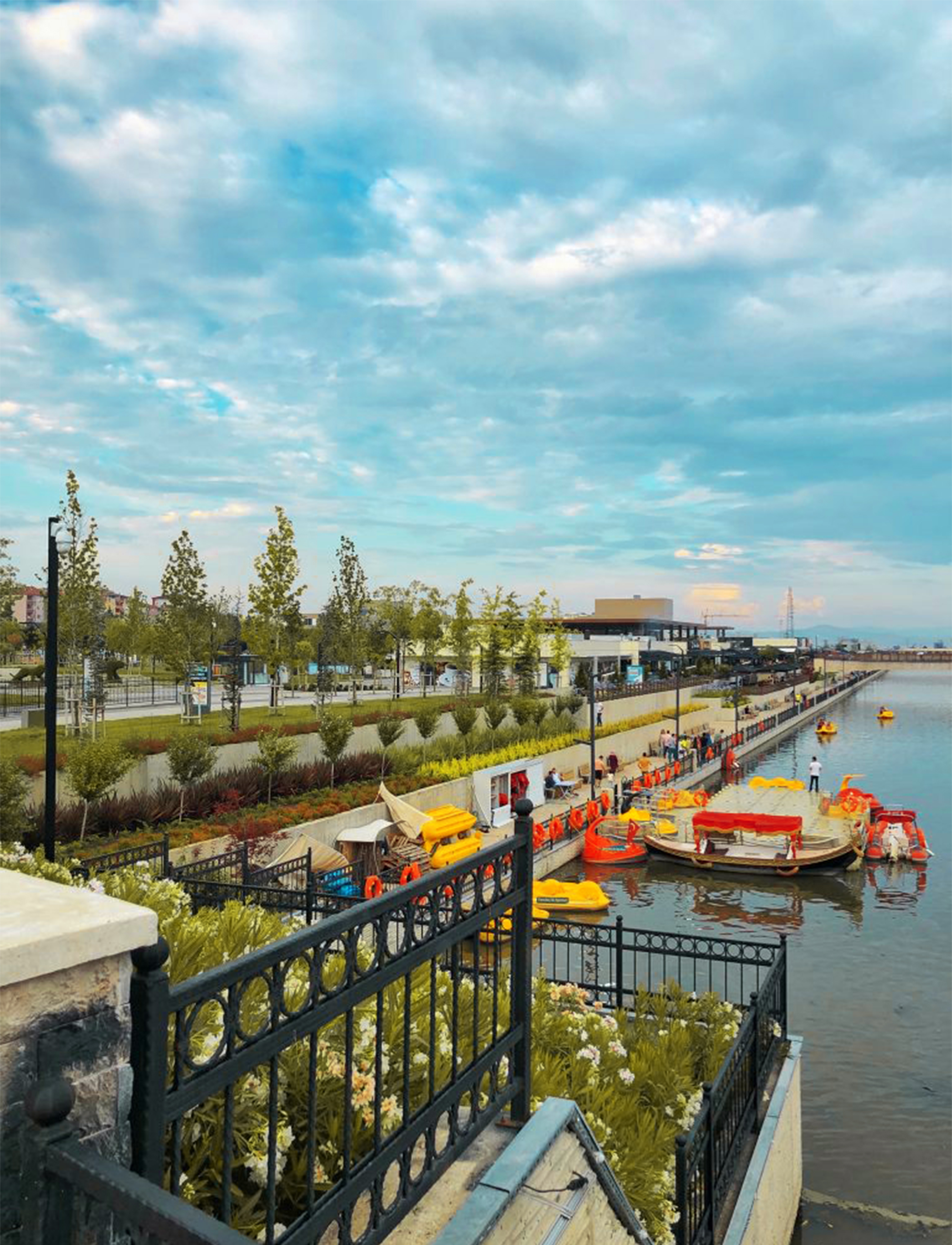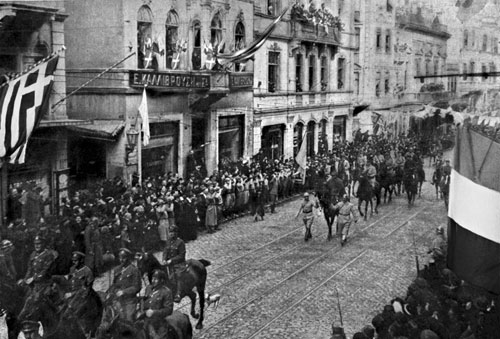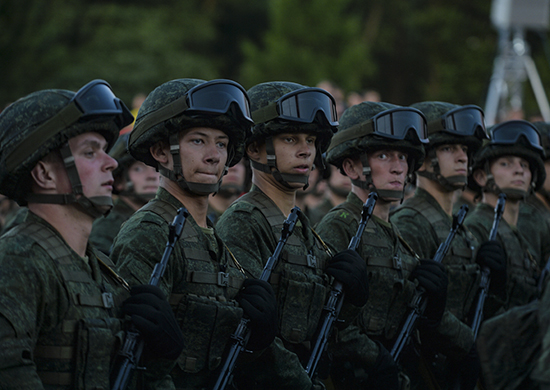|
Mustafa Necati
Mustafa Necati, also known as Mustafa Necati Uğural (1894 - January 1, 1929) was a Turkish statesman in the early years of the Turkish Republic, who served as the Minister of National Education during the reform period. He died before the Turkish Surname Law was adopted and the surname Uğural is actually the surname his family members adopted after his death. Early years Mustafa Necati was born in 1894 in İzmir. His father was Halit and his mother was Naciye. After his primary and secondary education in İzmir, he went to Istanbul for higher education and studied law. He returned to İzmir in 1914 to serve as a lawyer and teacher. In 1915 he established a private school with his friend Vasıf Çınar. He also served as a legal adviser for the local railway company. After the First World War in which the Ottoman Empire was defeated, the Allies fired the railway workers. He tried to defend the workers' rights by establishing a committee. Later he expanded his activities ... [...More Info...] [...Related Items...] OR: [Wikipedia] [Google] [Baidu] |
İzmir
İzmir ( , ; ), also spelled Izmir, is a metropolitan city in the western extremity of Anatolia, capital of the province of the same name. It is the third most populous city in Turkey, after Istanbul and Ankara and the second largest urban agglomeration on the Aegean Sea after Athens. As of the last estimation, on 31 December 2019, the city of İzmir had a population of 2,965,900, while İzmir Province had a total population of 4,367,251. Its built-up (or metro) area was home to 3,209,179 inhabitants extending on 9 out of 11 urban districts (all but Urla and Guzelbahce not yet agglomerated) plus Menemen and Menderes largely conurbated. It extends along the outlying waters of the Gulf of İzmir and inland to the north across the Gediz River Delta; to the east along an alluvial plain created by several small streams; and to slightly more rugged terrain in the south. İzmir has more than 3,000 years of recorded urban history, and up to 8,500 years of history as a human settlemen ... [...More Info...] [...Related Items...] OR: [Wikipedia] [Google] [Baidu] |
Manisa
Manisa (), historically known as Magnesia, is a city in Turkey's Aegean Region and the administrative seat of Manisa Province. Modern Manisa is a booming center of industry and services, advantaged by its closeness to the international port city and the regional metropolitan center of İzmir and by its fertile hinterland rich in quantity and variety of agricultural production. In fact, İzmir's proximity also adds a particular dimension to all aspects of life's pace in Manisa in the form of a dense traffic of daily commuters between the two cities, separated as they are by a half-hour drive served by a fine six-lane highway nevertheless requiring attention at all times due to its curves and the rapid ascent (sea-level to more than 500 meters at Sabuncubeli Pass) across Mount Sipylus's mythic scenery. The historic part of Manisa spreads out from a forested valley in the immediate slopes of Sipylus mountainside, along Çaybaşı Stream which flows next to Niobe's "Weeping Rock" (' ... [...More Info...] [...Related Items...] OR: [Wikipedia] [Google] [Baidu] |
Turkish Parliament
The Grand National Assembly of Turkey ( tr, ), usually referred to simply as the TBMM or Parliament ( tr, or ''Parlamento''), is the unicameral Turkish legislature. It is the sole body given the legislative prerogatives by the Turkish Constitution. It was founded in Ankara on 23 April 1920 in the midst of the National Campaign. This constitution had founded its pre-government known as 1st Executive Ministers of Turkey (Commitment Deputy Committee) in May 1920. The parliament was fundamental in the efforts of '' Mareşal'' Mustafa Kemal Atatürk, 1st President of the Republic of Turkey, and his colleagues to found a new state out of the remnants of the Ottoman Empire. Composition There are 600 members of parliament (deputies) who are elected for a five-year term by the D'Hondt method, a party-list proportional representation system, from 87 electoral districts which represent the 81 administrative provinces of Turkey (Istanbul and Ankara are divided into three electoral di ... [...More Info...] [...Related Items...] OR: [Wikipedia] [Google] [Baidu] |
Ottoman Parliament
The General Assembly ( tr, Meclis-i Umumî (French romanization: "Medjliss Oumoumi" ) or ''Genel Parlamento''; french: Assemblée Générale) was the first attempt at representative democracy by the imperial government of the Ottoman Empire. Also known as the Ottoman Parliament (french: Parlement Ottoman'' Legislation ottomane'' Volume 5: https://upload.wikimedia.org/wikipedia/commons/6/67/L%C3%A9gislation_ottomane_ou_Recueil_des_Aristarchi-Bey_Gr%C3%A9goire_Tome5.pdf p. 295 (PDF p. 299/370)), it was located in Constantinople (Istanbul) and was composed of two houses: an upper house (Senate, ''Meclis-i Âyân''), and a lower house (Chamber of Deputies, ''Meclis-i Mebusân''). The General Assembly was first constituted on 23 December 1876 and initially lasted until 14 February 1878, when it was dissolved by Sultan Abdul Hamid II. As a result of the Young Turk Revolution which brought substantial reforms and larger participation by political parties, the General Assembly was re ... [...More Info...] [...Related Items...] OR: [Wikipedia] [Google] [Baidu] |
Turkish War Of Independence
The Turkish War of Independence "War of Liberation", also known figuratively as ''İstiklâl Harbi'' "Independence War" or ''Millî Mücadele'' "National Struggle" (19 May 1919 – 24 July 1923) was a series of military campaigns waged by the Turkish National Movement after parts of the Ottoman Empire were occupied and partitioned following its defeat in World War I. These campaigns were directed against Greece in the west, Armenia in the east, France in the south, loyalists and separatists in various cities, and British and Ottoman troops around Constantinople (İstanbul). The ethnic demographics of the modern Turkish Republic were significantly impacted by the earlier Armenian genocide and the deportations of Greek-speaking, Orthodox Christian Rum people. The Turkish nationalist movement carried out massacres and deportations to eliminate native Christian populations—a continuation of the Armenian genocide and other ethnic cleansing operations during World War I. ... [...More Info...] [...Related Items...] OR: [Wikipedia] [Google] [Baidu] |
Balıkesir
Balıkesir () is a city in Turkey and is the capital city of Balıkesir Province. Balıkesir is located in the Marmara region of Turkey and has a population of 338,936. Between 1341–1922, it was the capital of Karasi. History Close to modern Balıkesir was the Roman town of '' Hadrianutherae'', founded, as its name commemorates, by the emperor Hadrian. Hadrian came to the region in A.D. 124, as a result of a successful bear hunting he had established a city called his name here. It is estimated that the city consisted of the castle, the homestead, the stud and a few homes. It is thought that the small town was where the current stadium is present. Members of the Roman and Pre-Byzantine dynasty had used this castle as a vacation area and for hunting. During the Byzantine period, the small town which had become increasingly neglected was known as ''Palaeokastron'' ( el, Παλαιόκαστρο) meaning Old Castle. Also, when the Turkomans came from Middle Asia to Mysia, ... [...More Info...] [...Related Items...] OR: [Wikipedia] [Google] [Baidu] |
Greek Army
The Hellenic Army ( el, Ελληνικός Στρατός, Ellinikós Stratós, sometimes abbreviated as ΕΣ), formed in 1828, is the land force of Greece. The term ''Hellenic'' is the endogenous synonym for ''Greek''. The Hellenic Army is the largest of the three branches of the Hellenic Armed Forces, also constituted by the Hellenic Air Force (HAF) and the Hellenic Navy (HN). The army is commanded by the chief of the Hellenic Army General Staff (HAGS), which in turn is under the command of Hellenic National Defence General Staff (HNDGS). The motto of the Hellenic Army is ('Freedom stems from valour'), from Thucydides's '' History of the Peloponnesian War (2.43.4)'', a remembrance of the ancient warriors that defended Greek lands in old times. The Hellenic Army Emblem is the two-headed eagle with a Greek Cross escutcheon in the centre. The Hellenic Army is also the main contributor to, and "lead nation" of, the Balkan Battle Group, a combined-arms rapid-response force unde ... [...More Info...] [...Related Items...] OR: [Wikipedia] [Google] [Baidu] |
Occupation Of İzmir
The city of Smyrna (modern-day İzmir) and surrounding areas were under Greek military occupation from 15 May 1919 until 9 September 1922. The Allied Powers authorized the occupation and creation of the Zone of Smyrna ( el, Ζώνη Σμύρνης, Zóni Smýrnis) during negotiations regarding the partition of the Ottoman Empire to protect the ethnic Greek population living in and around the city. The Greek landing on 15 May 1919 was celebrated by the substantial local Greek population but quickly resulted in ethnic violence in the area. This violence decreased international support for the occupation and led to a rise in Turkish nationalism. The high commissioner of Smyrna, Aristeidis Stergiadis, firmly opposed discrimination against the Turkish population by the administration; however, ethnic tensions and discrimination remained. Stergiadis also began work on projects involving resettlement of Greek refugees, the foundations for a university, and some public health projects. ... [...More Info...] [...Related Items...] OR: [Wikipedia] [Google] [Baidu] |
Military Reserve Force
A military reserve force is a military organization whose members have military and civilian occupations. They are not normally kept under arms, and their main role is to be available when their military requires additional manpower. Reserve forces are generally considered part of a permanent standing body of armed forces, and allow a nation to reduce its peacetime military expenditures and maintain a force prepared for war. In countries with a volunteer military, such as Canada, Spain, the United States and the United Kingdom, reserve forces are civilians who maintain military skills by training periodically (typically one weekend per month). They may do so as individuals or as members of standing reserve regiments—for example, the UK's Army Reserve (United Kingdom), Army Reserve. A militia, home guard, State defense force, state guard or state military may constitute part of a military reserve force, such as the National Guard (United States), United States National Guard a ... [...More Info...] [...Related Items...] OR: [Wikipedia] [Google] [Baidu] |
Allies Of World War I
The Allies of World War I, Entente Powers, or Allied Powers were a coalition of countries led by France, the United Kingdom, Russia, Italy, Japan, and the United States against the Central Powers of Germany, Austria-Hungary, the Ottoman Empire, Bulgaria, and their colonies during the First World War (1914–1918). By the end of the first decade of the 20th century, the major European powers were divided between the Triple Entente and the Triple Alliance. The Triple Entente was made up of France, Britain, and Russia. The Triple Alliance was originally composed of Germany, Austria–Hungary, and Italy, but Italy remained neutral in 1914. As the war progressed, each coalition added new members. Japan joined the Entente in 1914 and after proclaiming its neutrality at the beginning of the war, Italy also joined the Entente in 1915. The term "Allies" became more widely used than "Entente", although France, Britain, Russia, and Italy were also referred to as the Quadruple Entente ... [...More Info...] [...Related Items...] OR: [Wikipedia] [Google] [Baidu] |
First World War
World War I (28 July 1914 11 November 1918), often abbreviated as WWI, was one of the deadliest global conflicts in history. Belligerents included much of Europe, the Russian Empire, the United States, and the Ottoman Empire, with fighting occurring throughout Europe, the Middle East, Africa, the Pacific, and parts of Asia. An estimated 9 million soldiers were killed in combat, plus another 23 million wounded, while 5 million civilians died as a result of military action, hunger, and disease. Millions more died in genocides within the Ottoman Empire and in the 1918 influenza pandemic, which was exacerbated by the movement of combatants during the war. Prior to 1914, the European great powers were divided between the Triple Entente (comprising France, Russia, and Britain) and the Triple Alliance (containing Germany, Austria-Hungary, and Italy). Tensions in the Balkans came to a head on 28 June 1914, following the assassination of Archduke Franz Ferdina ... [...More Info...] [...Related Items...] OR: [Wikipedia] [Google] [Baidu] |





